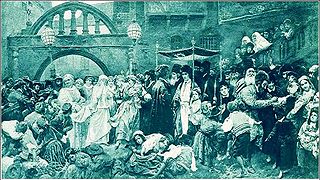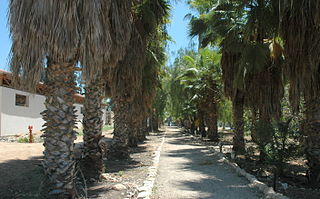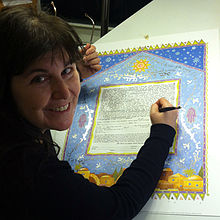
Marriage in Judaism is the documentation of a contract between a Jewish man and a Jewish woman. Because marriage under Jewish law is essentially a private contractual agreement between a man and a woman, it does not require the presence of a rabbi or any other religious official. It is common, however, for rabbis to officiate and there are rules governing the process of betrothal and consecration.

Beit Alfa is a kibbutz in the Northern District of Israel, founded in 1922 by immigrants from Poland. Located at the base of the Gilboa ridge, it falls under the jurisdiction of Gilboa Regional Council. As of 2022 its population was 1,386.

A ketubah is a Jewish marriage contract. It is considered an integral part of a traditional Jewish marriage, and outlines the rights and responsibilities of the groom, in relation to the bride. In modern practice, the ketubah has no agreed monetary value, and is seldom enforced by civil courts, except in Israel.
Ein Harod (Meuhad) (Hebrew: עֵין חֲרוֹד מְאֻחָד) is a kibbutz in northern Israel. Located in the Jezreel Valley near Mount Gilboa, it falls under the jurisdiction of Gilboa Regional Council. In 2022 it had a population of 779.

Anna Ticho was an Israeli artist who became famous for her drawings of the Jerusalem hills. Beit Ticho, the house in Jerusalem that she shared with her husband is now a branch of the Israel Museum and a café.
Archie Granot is a papercutting artist based in Israel. He works in traditional Jewish art, including ketubahs (ketubot), mizrachs, mezuzahs, haggadah and blessings for the Jewish life cycle, etc. Archie was born in London, England in 1946 and moved to Israel in 1967.

A Jewish wedding is a wedding ceremony that follows Jewish laws and traditions. While wedding ceremonies vary, common features of a Jewish wedding include a ketubah that is signed by two witnesses, a chuppah or huppah, a ring owned by the groom that is given to the bride under the canopy, and the breaking of a glass.
Shuli Nachshon is a video and installation artist, who lives and works in Israel.

Bar'am is a kibbutz in northern Israel. Located approximately 300 meters from Israel's border with Lebanon near the ruins of the ancient Jewish village of Kfar Bar'am. Bar'am National Park is known for the remains of one of Israel's oldest synagogues. The kibbutz falls under the jurisdiction of Upper Galilee Regional Council and had a population of 672 in 2022.

Ein Harod was a kibbutz in northern Israel near Mount Gilboa. Founded in 1921, it became the center of Mandatory Palestine's kibbutz movement, hosting the headquarters of the largest kibbutz organisation, HaKibbutz HaMeuhad.

Hanita is a kibbutz in northern Israel. Located in the western Galilee approximately 15 kilometres northeast of Nahariya, it falls under the jurisdiction of Mateh Asher Regional Council. In 2022 it had a population of 746.

Hulda is a kibbutz in central Israel. Located in the Shephelah near the Hulda Forest and the Burma Road, it falls under the jurisdiction of Gezer Regional Council. In 2022 it had a population of 1,187.
The Jewish Theological Seminary Library is one of the largest Jewish libraries in the world. Founded in 1893, it is located at the Jewish Theological Seminary of America in New York City, New York, and holds over 400,000 volumes, as well as extensive rare materials collections, including the world's largest collection of Hebrew manuscripts. Its holdings have been described as "the most impressive compilation of Jewish historical materials outside of Jerusalem." The library is an affiliate of the Columbia University Libraries.

Jewish paper cutting is a traditional form of Jewish folk art made by cutting figures and sentences in paper or parchment. It is connected with various customs and ceremonies, and associated with holidays and family life. Paper cuts often decorated ketubbot, Mizrahs, and ornaments for festive occasions. Paper cutting was practiced by Jewish communities in both Eastern Europe and North Africa and the Middle East for centuries and has seen a revival in modern times in Israel and elsewhere.

Sari Srulovitch is an Israeli artist and silversmith.
Claire Epstein was an Israeli archaeologist. She is noted for her discovery and work on the Chalcolithic culture in the Golan and was a noted member of the Israel Antiquities Authority.

Ruth Schloss was an Israeli painter and illustrator. Major themes in her work were Arabs, transition camps, children and women at eye-level. She expressed an egalitarian, socialist view via realism in her painting and drawing.

Naomi Frankel, also spelled Fraenkel and Frenkel, was a German-Israeli novelist. Born in Berlin, she was evacuated to Mandatory Palestine with other German-Jewish children in 1933. She became a member of Kibbutz Beit Alfa, where she lived until 1970. She began writing novels in 1956 and achieved fame with her trilogy Shaul ve-Yohannah, a three-generational tale of an assimilated German-Jewish family in prewar Germany. She wrote four other novels for adults as well as several books for children. In the 1980s Frankel abandoned her leftist convictions and adopted right-wing ideology, settling in the West Bank, where she died in 2009, aged 91.

The Birds' Head Haggadah is the oldest surviving illuminated Ashkenazi Passover Haggadah. The manuscript, produced in the Upper Rhine region of Southern Germany in the early 14th century, contains the full Hebrew text of the Haggadah, a ritual text recounting the story of Passover – the liberation of the Israelites from slavery in ancient Egypt – which is recited by participants at a Passover Seder. The text is executed in block calligraphy and accompanied by colorful illustrations of Jews performing the Seder practices and reenacting Jewish historical events.

Baruch Nachshon was an Israeli artist and mystic.















